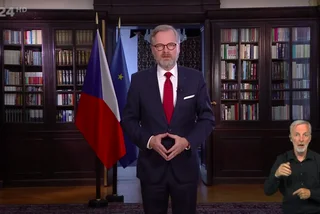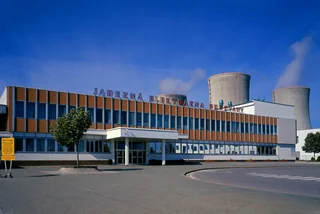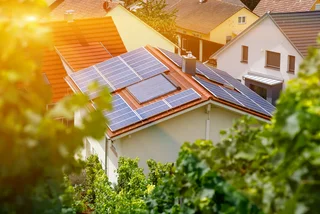In a televised address to the nation last week, Czech Prime Minister Petr Fiala made no bones about the tough times facing the country due to the global energy crisis.
“The increases in energy prices that await us over the coming months will come as a shock to many of you. The state does not have the money to compensate for this increase in full and to everyone,” came Fiala’s sobering warning.
The war in Ukraine has highlighted the extent of Czechia's dependency on Russia for energy supplies. Desperate to end this dependency, Fiala announced a commitment to making the Czech Republic an “energy sovereign state” within five years.
The aim is for Russian fossil fuels to be replaced with alternative supplies as well as more sustainable types of energy. But a herculean national effort to improve the energy efficiency of buildings and homes will also be key, and you can play a part.
The nuclear option
Nuclear is currently the most important energy source for the Czech Republic after fossil fuels. It's no surprise, then, that Fiala suggested the further development of nuclear power would be a key component of the drive for energy sovereignty.
But there’s a drawback: developing new reactors is very slow and complicated. Earlier this year, a tender was finally launched for a new nuclear unit in Dukovany, which won’t start generating energy until 2036.
The country’s largest energy provider ČEZ is now planning to build smaller reactors throughout the country. But the first tests aren’t expected until 2035.
“In the Dukovany plant, there is currently no easy way to replace Russian fuel. We have stocks for three years, but it’s questionable whether we could switch to another supplier right away,” Jiří Koželouh, head of the Climate, Energy, and Waste program at Hnutí Duha, said.
So it’s unlikely that a significant increase in nuclear energy as a proportion of the total energy mix can be achieved in the next five years. In this timeframe, the more important question is whether the current dependence on Russian nuclear fuel can be ended.
It was recently announced that nuclear fuel would be bought from the U.S.A and France for the Czech Republic’s other functioning nuclear plant, in Temelín. But this wasn’t necessarily a rapid response to Russia’s invasion of Ukraine; the tender for the new fuel deliveries started back in 2020.
So while the government wants to pivot away from Russian dependency in the nuclear sector, nuclear power won’t be able to achieve Fiala’s promised short-term fix for energy sovereignty.
Renewable incentives
Fiala also emphasized solar power as a pillar of the Czech Republic’s future energy security. But there's skepticism about how quickly the production of renewable energy can be ramped up.
“The development of renewable energy sources in the Czech Republic has stagnated for years, and this is why we have a problem. On the other hand, we have untapped potential,” Koželouh said.
In its policy program, the current government committed "to the establishment of new photovoltaic installations on at least 100,000 roofs by 2025." In light of the war in Ukraine, it’s thought the target for new rooftop solar units will double.
It’s hoped that this can be achieved by incentivizing individuals and businesses to install solar panels.
But Lukáš Hrábek, spokesman for Greenpeace Czech Republic, notes that the majority of imported Russian gas is used in heating for households and industry, not electricity generation. This means that despite their other benefits, photovoltaic developments probably won’t make a huge short-term difference to Russian fossil fuel dependency.
"Renewables can help replace Russian gas on sunny or windy days. But they can also help households and companies with high energy bills while covering a substantial part of long-term electricity consumption," he said.
Energy savings are key
Experts agree that as well as finding alternative fossil fuel suppliers, the most effective short-term solution for boosting Czechia’s energy sovereignty is boosting the energy efficiency of existing infrastructure, from industry to housing.
“We have potential in energy efficiency. For example, the proper insulation of buildings alone could reduce Russian gas dependency by a third. Heat pumps and biomass boilers could replace another sixth,” Koželouh said.
Advanced heat pump systems for district heating have been earmarked by the government as key to reducing Russian energy dependency, cutting out gas usage by large commercial properties and offices.
Hrábek agrees with the importance of energy efficiency in cutting out Russian supplies, saying that “insulation, energy savings, and alternative technologies are now more able to directly replace Russian energy than renewables."
And with many households and businesses already looking to save costs by cutting their energy usage, a collective effort for greater energy efficiency would kill two birds with one stone by also reducing dependency on Russia.
What can you do to save energy?
- Appliances used for heating are the biggest eaters of energy. An analysis by Seznam Zpravy recently found that reducing room temperatures by 1.5°C usually saves around 9 percent of the cost. In a house with an area of 120 square meters, which consumes around 14.4 MWh per year for heating, reducing the temperature in all rooms by 1.5°C can save you over CZK 4,200 a year.
- Another energy-saving tip is to reduce the water temperature in your boiler. For households with an electric boiler, reducing temperatures from 60°C to 50°C can save almost CZK 5,000 a year.
- Other small steps that can make a big difference include checking the temperature in your refrigerator. “Set +4°C on the refrigerator thermostat and -18°C in the freezer. A temperature only two degrees lower can mean higher consumption by up to 15 percent,” official advice from ČEZ states.
- On average, replacing classic light bulbs with LED bulbs can save thousands of crowns per year; Seznam’s calculation found that eight new LED bulbs result in savings of around CZK 2,300 per year.
- A final tip is fully unplugging appliances when they’re not being used. A small amount of energy is still being used when appliances are left in “standby mode,” adding up to thousands of crowns of additional costs a year for most households.












 Reading time: 5 minutes
Reading time: 5 minutes 
































